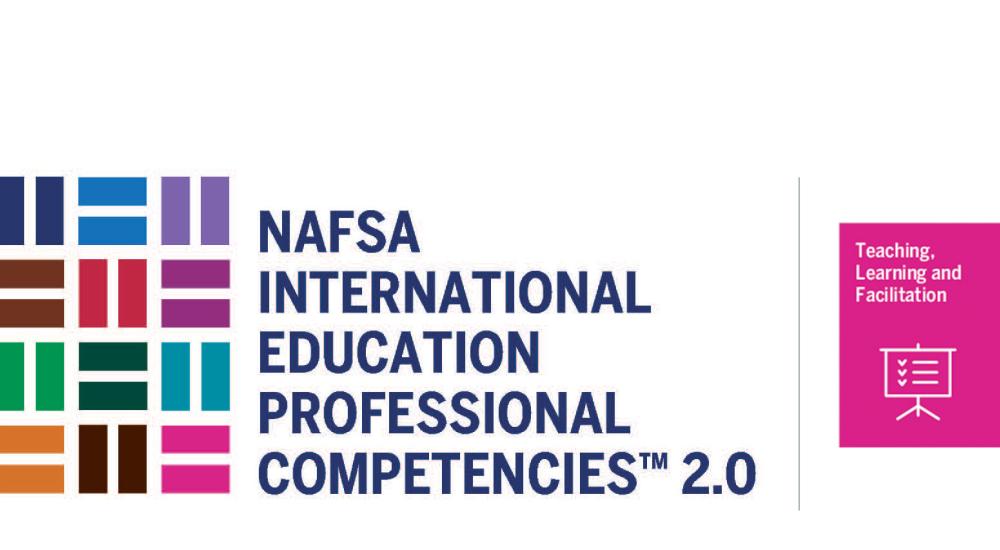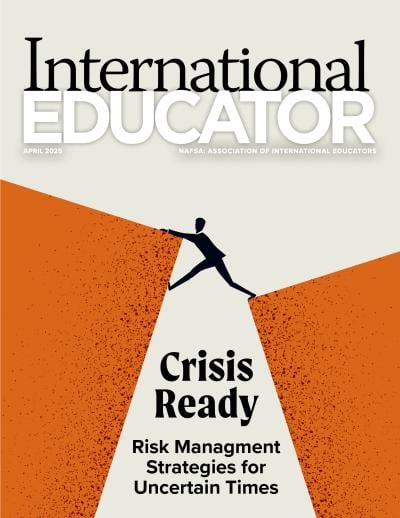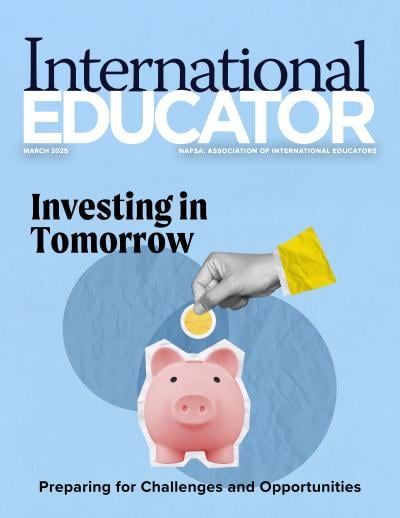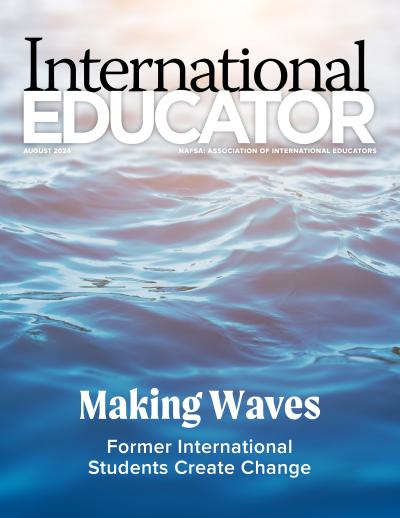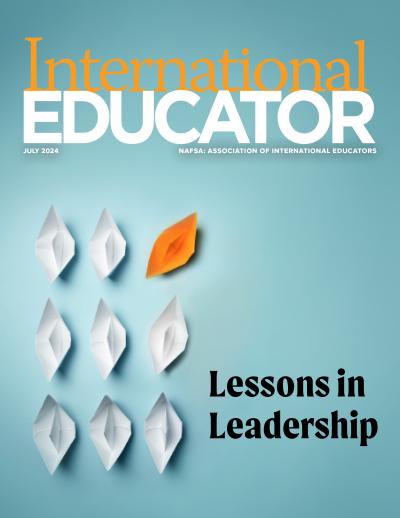Empowering the Next Generation: Graduate Students in International Education

She must balance her graduate studies with her responsibilities as a new mother. He’s working two jobs but still can’t pay for his schooling. She coaches undergraduates during the day and crams at night for her own exams.
The challenges of graduate students are unlike those of many undergraduates.
This is where international educators can step in—offering mentoring, networking and job opportunities, research and study assistance, and family support to help graduate students in the international education field manage the distinct challenges they face and further their professional and educational aspirations.
“I feel a lot of responsibility knowing this—[that] for graduate students in international education, it’s all about gaining the skills, knowledge, and networks that will allow them to find work and grow their careers,” says Sora Friedman, a faculty member and chair of the MA in international education program at the Vermont-based SIT Graduate Institute. “They see their graduate training and degrees as direct pathways to their future careers and want to know that their investments of time and money will meet their expectations.”
Graduate Students’ Priorities and Motivations
Graduate students typically focus on doing research and policy analysis and gaining practical experience to develop the specialized knowledge and skills that will prepare them to lead the field and address the complex challenges they’ll face in their careers.
“They see their graduate training and degrees as direct pathways to their future careers and want to know that their investments of time and money will meet their expectations.” —Sora Friedman
Unlike most undergraduates, graduate students’ priorities extend far beyond coursework: Many are early- to mid-career professionals, working hard to establish themselves in their careers even as they pursue educational advancement. They’re often building a robust professional network and contributing to the broader discourse in international education.
“They want to shift the field or, even more practically, just find a place in it with a bit of stability and a chance to advance in higher education or related areas,” says Brian David Seilstad, director of the Internationalization and Partnerships Office at Al Akhawayn University in Morocco and Intercultural Communications and Engagement Coordinator for NAFSA’s Teaching, Learning, and Scholarship Knowledge Community. “Many see IE as a way to continue their international journey, especially [since] many of them had powerful experiences with…study abroad during their undergraduate years.”
Seilstad also emphasizes that today’s graduate students come from a generation that cares deeply about issues related to justice, equity, diversity, and inclusion—and want to make a difference.
“Many of these students come from diverse backgrounds and experiences, [and those experiences help] push the field to understand the lived experiences of others,” Seilstad says. “These students tend to push for further inclusion of historically marginalized voices and, in terms of research methods, [expansion of] the ways to understand [international education] from multiple perspectives.”
The Challenges
In pursuing these objectives, graduate students face unique, formidable challenges. The specific nature of these challenges depends in part on the types of study programs they choose, but common difficulties include work-life balance, time management, and financial stressors.
At Friedman’s institution, a global program is designed for students who can be in school full-time—meaning that this group is pressured to put the nonacademic part of their lives on hold for up to 16 months.
Many students in part-time programs continue working while pursuing their graduate studies and therefore need some degree of flexibility from their programs, such as extensions on school papers and projects, so they can tend to time-sensitive matters at work, she says.
Financial pressure is another daunting challenge. Graduate school represents a significant expense, and many find it hard to fund their coursework. All of these stressors add up and can take a toll on students’ physical and mental well-being.
“It becomes very difficult for them to maintain balance in their lives, and often there is a real impact on their health,” says Laura Rodriguez Amaya, director of Texas State University’s International Student and Scholar Services (ISSS) Office. “I am aware of a graduate student who was experiencing serious health problems because of the significant stress she was under as a self-funded student.”
Rodriguez Amaya says that additional stressors for international students in international education include being away from their established social support networks and navigating new social and professional norms. These challenges can be particularly acute for international graduate students.
Finally, many of these students must manage their academic responsibilities while navigating pivotal life events. “Think breakups, engagements, weddings, pregnancies, caring for young children, elder care, and decisions about where to settle down long term,” Friedman says.
As someone who became a parent while pursuing his doctoral degree, Santiago Castiello-Gutiérrez can certainly attest to the balancing act required to finish his studies.
“[You are] handling multiple personal and professional responsibilities while being enrolled in a demanding educational program,” says Castiello-Gutiérrez, assistant professor in the Department of Education Leadership, Management, and Policy at Seton Hall University in New Jersey. “It is definitely the most challenging part. Students need to feel supported by their employers and their educational institutions.”
The Critical Role of Mentors
With competing priorities and the myriad pressures they face, graduate students in international education programs can benefit from support from someone who has been in their shoes.
At Texas State University, the ISSS office launched a peer-to-peer mentoring program in fall 2023. It supports new graduate students by pairing them with more senior students who can guide the newcomers in their personal lives and professional development.
“Our graduate interns lead this program and have contributed significantly to its success, each in their own way,” Rodriguez Amaya says. “That could be by making a program more accessible to a grad using new technology or by finding new ways for grads to engage with colleagues and fellow students or by tailoring a grad’s training program to better fit their circumstances.”
Friedman notes that it’s important for mentors to set aside time for regular meetings, to ask how things are going, and to truly listen to try to understand students’ circumstances.
Castiello-Gutiérrez points out that graduate students often neglect their physical and mental health and that educators can advise students on how to manage their educational responsibilities without sacrificing their overall well-being.
“No academic program or job is worth losing your health over,” he says. “You need to [counsel students to] be strategic, doing the best they can without aiming for excellence and perfection in everything. Also, [helping them] find a support community is essential. Graduate education tends to be more individualistic than undergraduate, but being part of a writing or study group, for instance, can help enhance one’s network and sense of belonging.”
A mentor or seasoned professional in the field can also help students find ways to disconnect from the pressures of coursework, deadlines, family demands, and finances. Some suggestions include scheduling time with friends, signing up with campus organizations that align with the student’s interests or passions, and connecting students who have small children with other parents who can offer advice and support.
Networking and Professional Development
While including downtime in their schedules is important, graduate students in international education also need to prioritize networking and professional opportunities, which are vital to their success and don’t always come naturally. Mentors and other international educators already working in the field can play an important role in supporting students and, in doing so, can pay it forward to the next generation.
“The idea of networking can be intimidating, and for graduate students of diverse backgrounds, quite foreign,” Rodriguez Amaya says. “International or first-generation [students] might not be aware of U.S. networking social norms. Higher [education] institutions send strong messages to students on the importance of networking for their future career and jobs, but we do a terrible job of giving them the tools to do it successfully.”
But experienced professionals can help connect students with the opportunities that will serve them best and with a community that will support them during their graduate work and throughout their careers. “The international education field is a very open community full of amazing individuals,” Castiello-Gutiérrez says. “Organizations such as NAFSA, through their different activities, including the regional and national conferences, represent a great way to foster spaces for mentoring.”
"Higher [education] institutions send strong messages to students on the importance of networking for their future career and jobs, but we do a terrible job of giving them the tools to do it successfully.” —Laura Rodriguez Amaya
When it comes to supporting students’ professional development, Friedman argues for a proactive approach. “Invite students to sit in on higher-level meetings to get a sense of the decision-making processes at more senior levels. Provide opportunities for joint research, writing, and project implementation. Offer feedback. Be willing to speak on behalf of a mentee. Keep your eyes open for possible jobs.”
Periodically, Seilstad gets requests from graduate students to help with research studies and conference presentations—requests that he makes sure to prioritize.
“My main goal with all these asks is to say yes as much as I can and use whatever power and influence I might have to help them advance their goals,” he says.
Everyone Benefits
As graduate students in international education navigate the balance between their academic pursuits and personal responsibilities, professionals already working in the field can play a role in supporting their success and well-being. By listening, mentoring, and facilitating opportunities for professional development, experienced professionals not only support graduate students’ goals but also create an environment where all parties can benefit from mutual learning and growth.
As Seilstad notes, "Overall, I think [grad students] just need to have as much encouragement and engagement as possible, and those of us with more established roles have, I think, a great opportunity to learn from and with graduate students.”
NAFSA Resources
- Upcoming Community Dialogue: Grad Student Forum at the NAFSA 2024 Annual Conference & Expo
- NAFSA's Teaching, Learning, and Scholarship Knowledge Community (TLS KC)
- Trends & Insights: "Responding to International Graduate Student Enrollment Trends: Lessons for the Future" by Radomir Ray Mitic
- Trends & Insights: "Universities as Global Villages: Supporting International Students on Campus" by Santiago Castiello-Gutiérrez and Kelber Tozini
About International Educator
International Educator is NAFSA’s flagship publication and has been published continually since 1990. As a record of the association and the field of international education, IE includes articles on a variety of topics, trends, and issues facing NAFSA members and their work.
From in-depth features to interviews with thought leaders and columns tailored to NAFSA’s knowledge communities, IE provides must-read context and analysis to those working around the globe to advance international education and exchange.
About NAFSA
NAFSA: Association of International Educators is the world's largest nonprofit association dedicated to international education and exchange. NAFSA serves the needs of more than 10,000 members and international educators worldwide at more than 3,500 institutions, in over 150 countries.
NAFSA membership provides you with unmatched access to best-in-class programs, critical updates, and resources to professionalize your practice. Members gain unrivaled opportunities to partner with experienced international education leaders.


